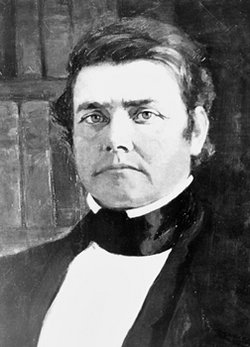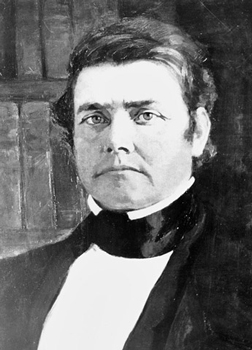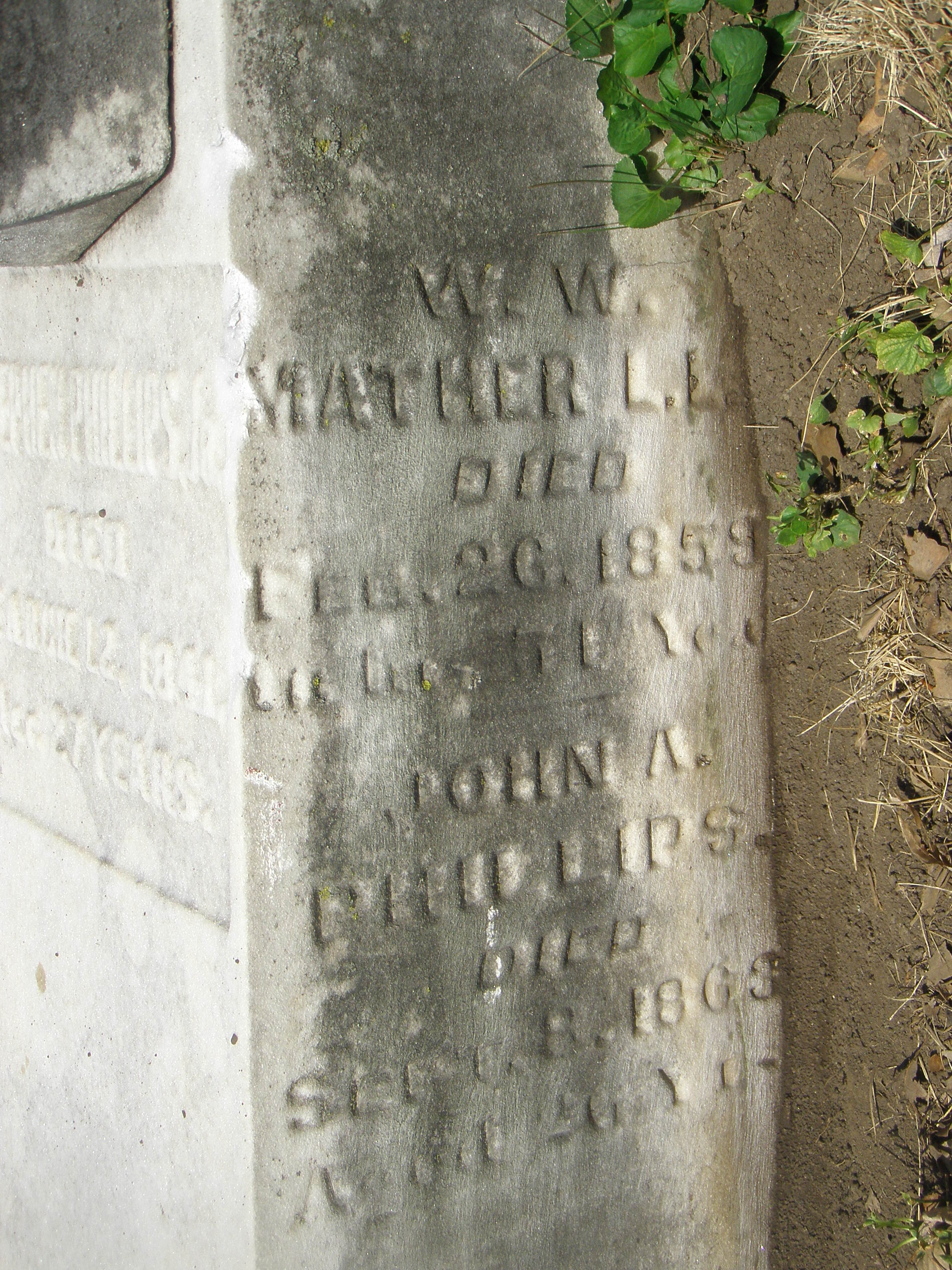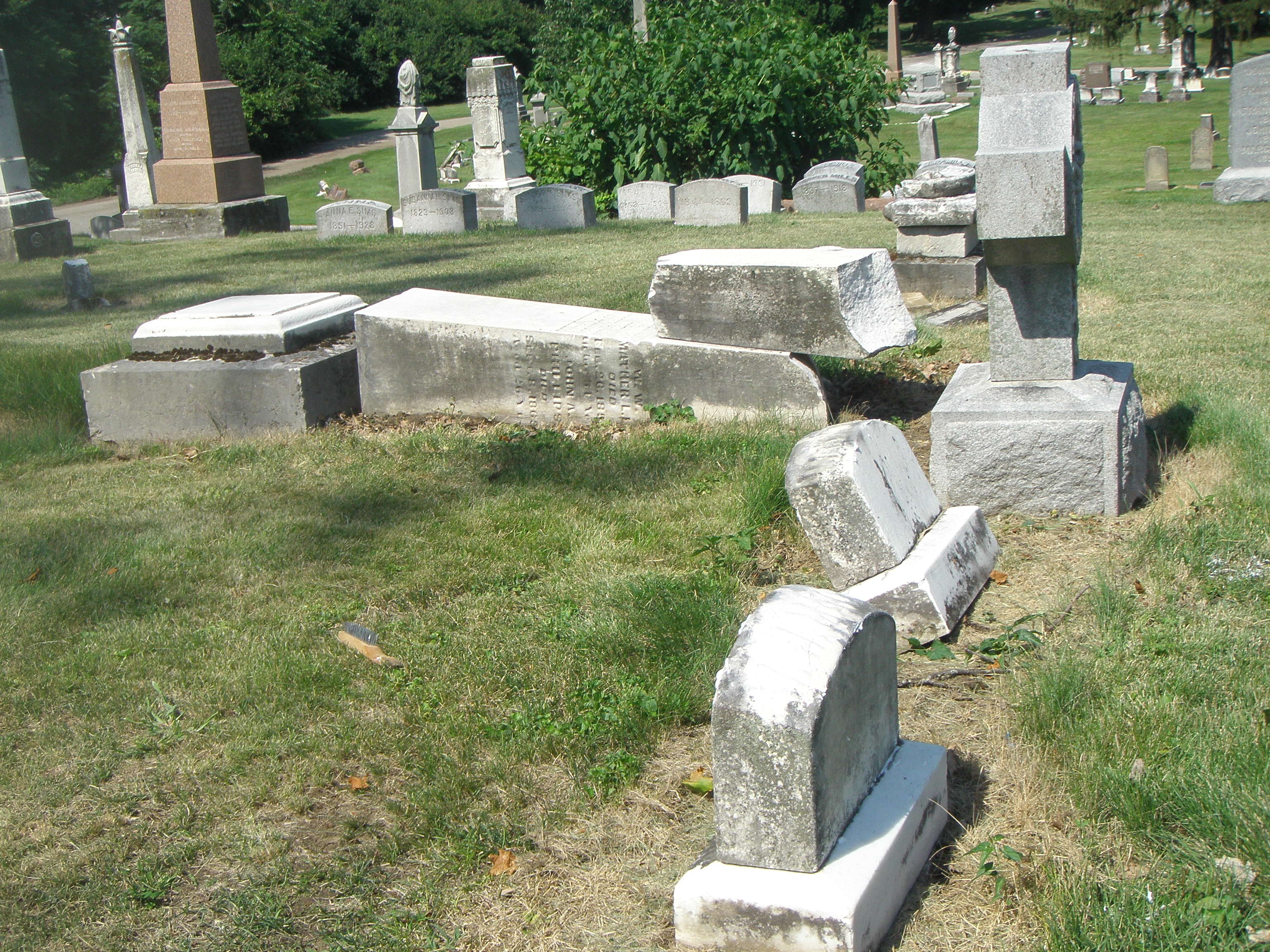------------------------------------------------------
THE MATHER CEMETERY [AKA: Pierce Mather's Cemetery, Jackson County, Ohio - circa: 2020]
Prof. William W. Mather was appointed to begin the geological survey of Ohio in 1837. This work brought him to Jackson county, and after the work on the survey was discontinued in 1838, he settled in Jackson. The family boarded at first with Mr. Jacob Westfall. Mather soon purchased the land of Rev. David C. Bolles on Salt Creek, and erected a fine residence for those times. The mansion stood on a slope overlooking Salt Creek valley, and not farm from the top of the hill where the cemetery is now. It was a picturesque spot then, when the virgin forest had not yet been touched, but it must have been a very lonesome place for a family that had lived in cities. The house was removed years ago by W. W. Pierce, who purchased the land from Prof. Mather, but the cellar and well still remain. The cellar seems to have been under the whole house. The well is about one hundred feet deep and no water was found. Later, water gathered in it, and now stands at about sixty feet. The survivors of the old orchard are scattered about, and all goes to show that Prof. Mather endeavored to secure for his family all the comforts of those times.
Here the family lived for about ten years. Then death came and Mrs. Mather was taken. Upon her death Prof. Mather laid out a cemetery upon the point overlooking the mansion and deeded it to the township. In a year or two afterward, he removed to live in Columbus, where he died in 1859 of heart disease. The inscription on Mrs. Mather's tombstone is as follows:
"Here lie the earthly remains of Emily Maria Mather, wife of William W. Mather, who died November 19, 1850, aged 40 years. A triumphant death in the firm unwavering faith and Christian hope of eternal life in heaven. She was a good wife, a kind neighbor, a tender mother and a faithful Christian."
On the earth side of her grave lie the remains of her infants. The inscriptions on the stones are as follows:
"Cotton Mather, infant son of W. W. and E. M. Mather, died 1849."
"Increase Mather, infant son of W. W. and E. M. Mather, died 1840."
Source:
History of Jackson County, Ohio --- by D. W. Williams
- Vol. I. - The Scioto Salt Springs - Jackson, Ohio --- 1900 -- Pg 172
Biographical Sketch taken from website :
http://penelope.uchicago.edu/Thayer/E/Gazetteer/Places/America/United_States/Army/USMA/Cullums_Register/522.html
Professor William W. Mather was born, May 24, 1804, in Brooklyn, Conn. He was a lineal descendant of the distinguished divine, Richard Mather, who emigrated to this country in 1635; whose son, Increase, was President of Harvard College from 1688 to 1701; and whose grandson was the celebrated Cotton Mather.
Little is known of young Mather till he received a Cadet's appointment through strong but not political influence, aided by the fact that three of his near relatives had done good service in the Revolutionary War.
In 1828 Mather was graduated from the Military Academy, fifteenth in a class whose head was Albert E. Church, the able Professor of Mathematics in that institution, and whose twenty-third member was Jefferson Davis, the ephemeral President of the Southern Confederacy. While yet a student at West Point, Mather, despite many able rivals, took the lead in Chemistry, Mineralogy, and Geology, for which branches of science he had a natural predilection.
Upon graduation Mather was promoted to the Infantry, and, after a p413year's service on the frontier, was sent back to the Academy as Asst. Professor of Chemistry, Mineralogy, and Geology. Here he served for six years as a very efficient instructor, and devoted all of his leisure hours to study and to writing upon these branches for scientific journals or text-books.
Upon leaving West Point, in 1835, he was detailed as Assistant Geologist for the examination of the region from Green Bay, Mich., to Coteau des Prairies, Dak., particularly the valley of St. Peter's River, of which he made a topographical map. At the close of 1835 he rejoined his regiment, and, after a short service on the southwestern frontier, he resigned from the Army, Aug. 31, 1836, to devote the remainder of his life to his favorite pursuits.
His subsequent Professorships; his services as Geologist in the States of New York, Ohio, and Kentucky; his employment as Mining Engineer in the Lake Superior region, and in New Jersey, Virginia, and Massachusetts; his occupation for years as an Agricultural Chemist; and his labors as an Author upon various subjects of general science, — we have fully detailed in the record of his services.
His reputation as a scientist brought him the degree of A. M. from Wesleyan University, Conn., in 1833; and of LL. D. from Brown University, R. I., in 1836. He was also a member of various scientific, historical, and literary associations.
At the early age of fifty-four, Mather, in the midst of a life of usefulness, died, Feb. 27, 1859, at Columbus, Ohio. His classmate and friend, Ivers J. Austin, thus sums up his character:—
"Not possessing the genius which dazzles, he had the intellect which, continually improved by exercise, achieved valuable results by patient and conscientious industry. What duty demanded, that he performed regardless of consequences, either to himself or to others. Not indifferent to fame, he never sought it by doubtful or devious courses. His object was not to enhance his reputation, but faithfully to do the work before him. Through the whole of his active and laborious life of thirty years in the cause of science, in all the bar and important public positions which he occupied, no breath of censure assailed his integrity, 'which was a law of nature with him, rather than a choice or a principle.' . . . Equable in his disposition and gentle in his manners, considerate of others and just in his judgment of them, modest, but manly and self-reliant, he had neither dogmatism nor ostentation. . . . Never elated by success nor depressed by occasional failure, a genial companion, a firm friend, and a zealous Christian, he pursued the even tenor of his way till death, too soon for science and his country, removed him from the earth."
------------------------------------------------------
THE MATHER CEMETERY [AKA: Pierce Mather's Cemetery, Jackson County, Ohio - circa: 2020]
Prof. William W. Mather was appointed to begin the geological survey of Ohio in 1837. This work brought him to Jackson county, and after the work on the survey was discontinued in 1838, he settled in Jackson. The family boarded at first with Mr. Jacob Westfall. Mather soon purchased the land of Rev. David C. Bolles on Salt Creek, and erected a fine residence for those times. The mansion stood on a slope overlooking Salt Creek valley, and not farm from the top of the hill where the cemetery is now. It was a picturesque spot then, when the virgin forest had not yet been touched, but it must have been a very lonesome place for a family that had lived in cities. The house was removed years ago by W. W. Pierce, who purchased the land from Prof. Mather, but the cellar and well still remain. The cellar seems to have been under the whole house. The well is about one hundred feet deep and no water was found. Later, water gathered in it, and now stands at about sixty feet. The survivors of the old orchard are scattered about, and all goes to show that Prof. Mather endeavored to secure for his family all the comforts of those times.
Here the family lived for about ten years. Then death came and Mrs. Mather was taken. Upon her death Prof. Mather laid out a cemetery upon the point overlooking the mansion and deeded it to the township. In a year or two afterward, he removed to live in Columbus, where he died in 1859 of heart disease. The inscription on Mrs. Mather's tombstone is as follows:
"Here lie the earthly remains of Emily Maria Mather, wife of William W. Mather, who died November 19, 1850, aged 40 years. A triumphant death in the firm unwavering faith and Christian hope of eternal life in heaven. She was a good wife, a kind neighbor, a tender mother and a faithful Christian."
On the earth side of her grave lie the remains of her infants. The inscriptions on the stones are as follows:
"Cotton Mather, infant son of W. W. and E. M. Mather, died 1849."
"Increase Mather, infant son of W. W. and E. M. Mather, died 1840."
Source:
History of Jackson County, Ohio --- by D. W. Williams
- Vol. I. - The Scioto Salt Springs - Jackson, Ohio --- 1900 -- Pg 172
Biographical Sketch taken from website :
http://penelope.uchicago.edu/Thayer/E/Gazetteer/Places/America/United_States/Army/USMA/Cullums_Register/522.html
Professor William W. Mather was born, May 24, 1804, in Brooklyn, Conn. He was a lineal descendant of the distinguished divine, Richard Mather, who emigrated to this country in 1635; whose son, Increase, was President of Harvard College from 1688 to 1701; and whose grandson was the celebrated Cotton Mather.
Little is known of young Mather till he received a Cadet's appointment through strong but not political influence, aided by the fact that three of his near relatives had done good service in the Revolutionary War.
In 1828 Mather was graduated from the Military Academy, fifteenth in a class whose head was Albert E. Church, the able Professor of Mathematics in that institution, and whose twenty-third member was Jefferson Davis, the ephemeral President of the Southern Confederacy. While yet a student at West Point, Mather, despite many able rivals, took the lead in Chemistry, Mineralogy, and Geology, for which branches of science he had a natural predilection.
Upon graduation Mather was promoted to the Infantry, and, after a p413year's service on the frontier, was sent back to the Academy as Asst. Professor of Chemistry, Mineralogy, and Geology. Here he served for six years as a very efficient instructor, and devoted all of his leisure hours to study and to writing upon these branches for scientific journals or text-books.
Upon leaving West Point, in 1835, he was detailed as Assistant Geologist for the examination of the region from Green Bay, Mich., to Coteau des Prairies, Dak., particularly the valley of St. Peter's River, of which he made a topographical map. At the close of 1835 he rejoined his regiment, and, after a short service on the southwestern frontier, he resigned from the Army, Aug. 31, 1836, to devote the remainder of his life to his favorite pursuits.
His subsequent Professorships; his services as Geologist in the States of New York, Ohio, and Kentucky; his employment as Mining Engineer in the Lake Superior region, and in New Jersey, Virginia, and Massachusetts; his occupation for years as an Agricultural Chemist; and his labors as an Author upon various subjects of general science, — we have fully detailed in the record of his services.
His reputation as a scientist brought him the degree of A. M. from Wesleyan University, Conn., in 1833; and of LL. D. from Brown University, R. I., in 1836. He was also a member of various scientific, historical, and literary associations.
At the early age of fifty-four, Mather, in the midst of a life of usefulness, died, Feb. 27, 1859, at Columbus, Ohio. His classmate and friend, Ivers J. Austin, thus sums up his character:—
"Not possessing the genius which dazzles, he had the intellect which, continually improved by exercise, achieved valuable results by patient and conscientious industry. What duty demanded, that he performed regardless of consequences, either to himself or to others. Not indifferent to fame, he never sought it by doubtful or devious courses. His object was not to enhance his reputation, but faithfully to do the work before him. Through the whole of his active and laborious life of thirty years in the cause of science, in all the bar and important public positions which he occupied, no breath of censure assailed his integrity, 'which was a law of nature with him, rather than a choice or a principle.' . . . Equable in his disposition and gentle in his manners, considerate of others and just in his judgment of them, modest, but manly and self-reliant, he had neither dogmatism nor ostentation. . . . Never elated by success nor depressed by occasional failure, a genial companion, a firm friend, and a zealous Christian, he pursued the even tenor of his way till death, too soon for science and his country, removed him from the earth."
Family Members
Advertisement
Advertisement






















